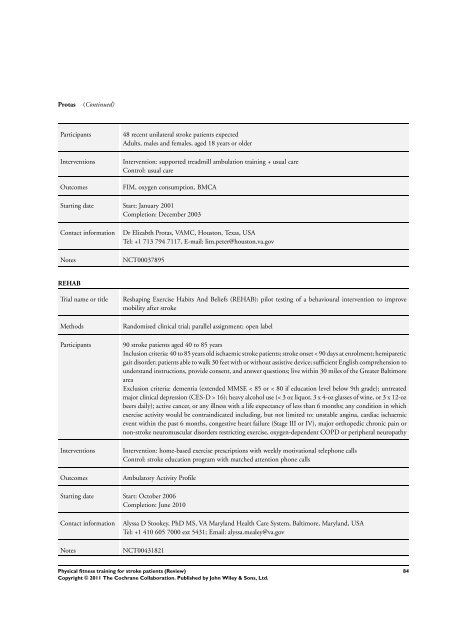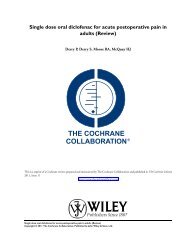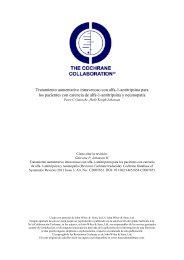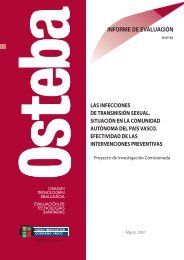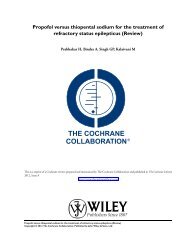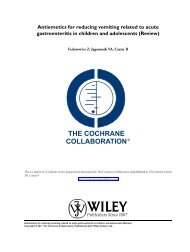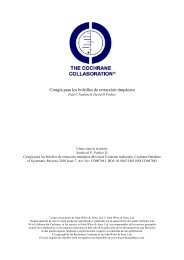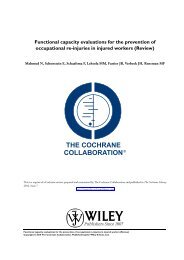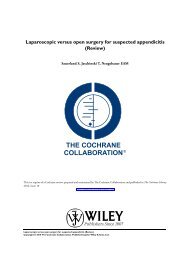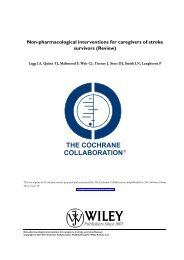Physical fitness training for stroke patients (Review) - Update Software
Physical fitness training for stroke patients (Review) - Update Software
Physical fitness training for stroke patients (Review) - Update Software
Create successful ePaper yourself
Turn your PDF publications into a flip-book with our unique Google optimized e-Paper software.
Protas (Continued)<br />
Participants 48 recent unilateral <strong>stroke</strong> <strong>patients</strong> expected<br />
Adults, males and females, aged 18 years or older<br />
Interventions Intervention: supported treadmill ambulation <strong>training</strong> + usual care<br />
Control: usual care<br />
Outcomes FIM, oxygen consumption, BMCA<br />
Starting date Start: January 2001<br />
Completion: December 2003<br />
Contact in<strong>for</strong>mation Dr Elizabth Protas, VAMC, Houston, Texas, USA<br />
Tel: +1 713 794 7117, E-mail: lim.peter@houston.va.gov<br />
Notes NCT00037895<br />
REHAB<br />
Trial name or title Reshaping Exercise Habits And Beliefs (REHAB): pilot testing of a behavioural intervention to improve<br />
mobility after <strong>stroke</strong><br />
Methods Randomised clinical trial; parallel assignment; open label<br />
Participants 90 <strong>stroke</strong> <strong>patients</strong> aged 40 to 85 years<br />
Inclusion criteria: 40 to 85 years old ischaemic <strong>stroke</strong> <strong>patients</strong>; <strong>stroke</strong> onset < 90 days at enrolment; hemiparetic<br />
gait disorder; <strong>patients</strong> able to walk 30 feet with or without assistive device; sufficient English comprehension to<br />
understand instructions, provide consent, and answer questions; live within 30 miles of the Greater Baltimore<br />
area<br />
Exclusion criteria: dementia (extended MMSE < 85 or < 80 if education level below 9th grade); untreated<br />
major clinical depression (CES-D > 16); heavy alcohol use (< 3 oz liquor, 3 x 4-oz glasses of wine, or 3 x 12-oz<br />
beers daily); active cancer, or any illness with a life expectancy of less than 6 months; any condition in which<br />
exercise activity would be contraindicated including, but not limited to: unstable angina, cardiac ischaemic<br />
event within the past 6 months, congestive heart failure (Stage III or IV), major orthopedic chronic pain or<br />
non-<strong>stroke</strong> neuromuscular disorders restricting exercise, oxygen-dependent COPD or peripheral neuropathy<br />
Interventions Intervention: home-based exercise prescriptions with weekly motivational telephone calls<br />
Control: <strong>stroke</strong> education program with matched attention phone calls<br />
Outcomes Ambulatory Activity Profile<br />
Starting date Start: October 2006<br />
Completion: June 2010<br />
Contact in<strong>for</strong>mation Alyssa D Stookey, PhD MS, VA Maryland Health Care System, Baltimore, Maryland, USA<br />
Tel: +1 410 605 7000 ext 5431; Email: alyssa.mealey@va.gov<br />
Notes NCT00431821<br />
<strong>Physical</strong> <strong>fitness</strong> <strong>training</strong> <strong>for</strong> <strong>stroke</strong> <strong>patients</strong> (<strong>Review</strong>)<br />
Copyright © 2011 The Cochrane Collaboration. Published by John Wiley & Sons, Ltd.<br />
84


